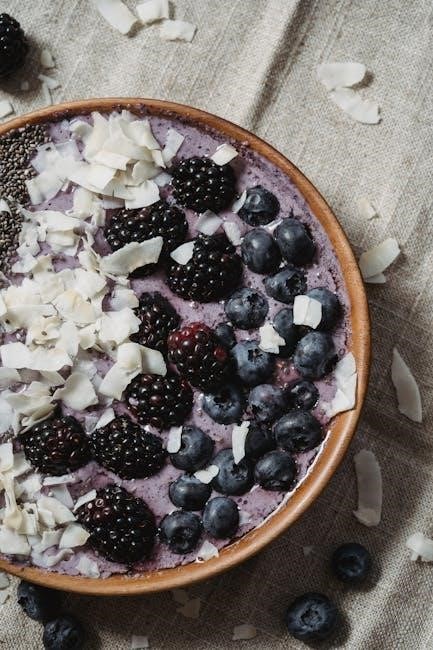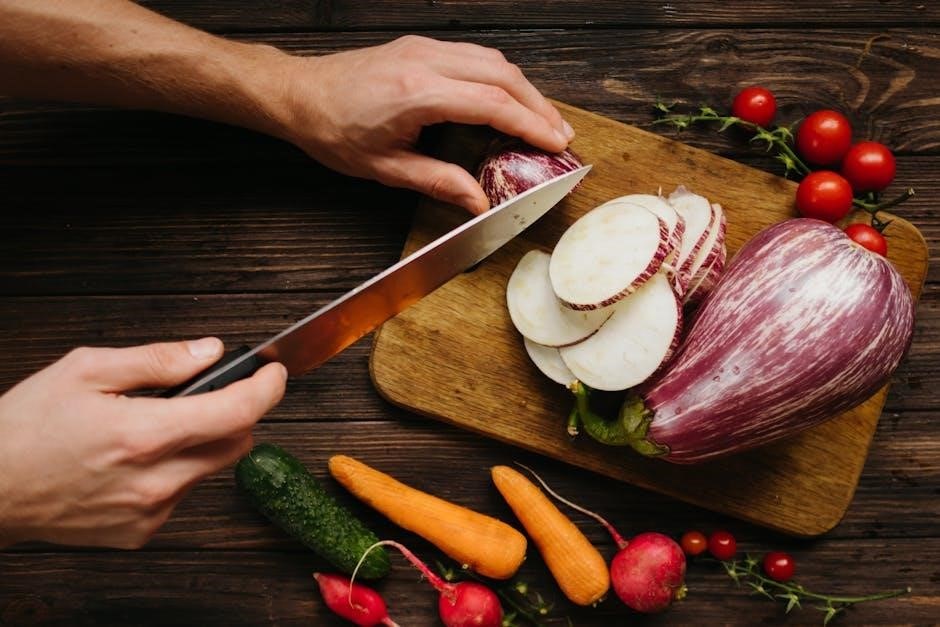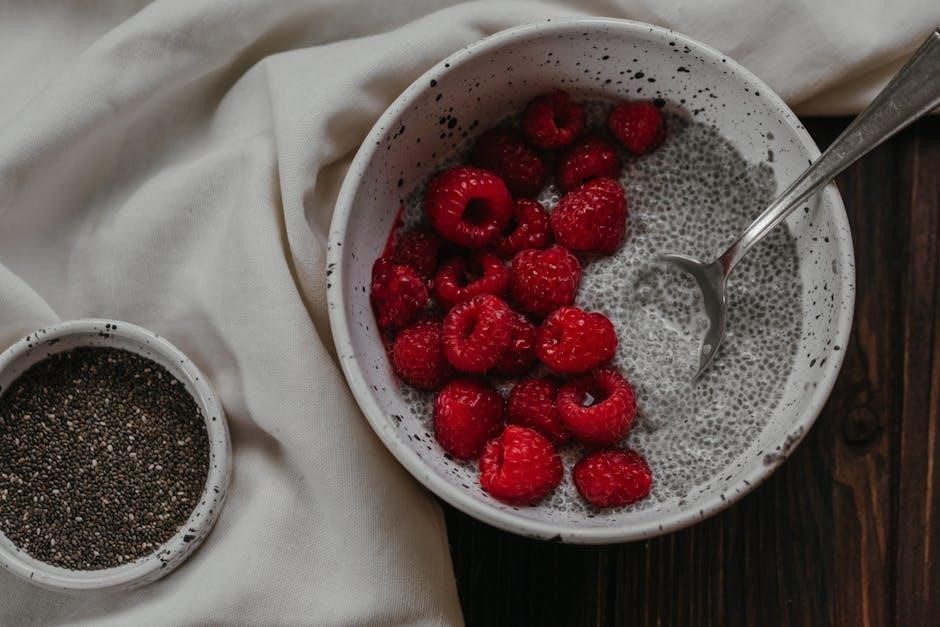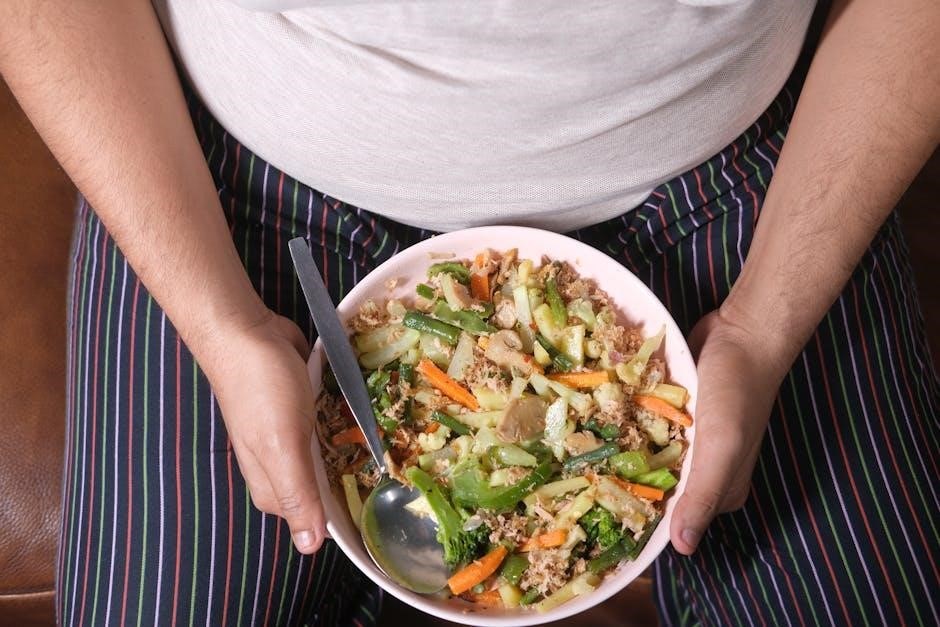A well-structured vegan weight loss meal plan focuses on plant-based foods, promoting sustainable weight management. It emphasizes high-fiber, low-calorie ingredients and healthy fats, offering a nutritious pathway to achieving and maintaining a healthy weight.
Understanding the Benefits of a Plant-Based Diet for Weight Loss
A plant-based diet offers numerous benefits for weight loss, primarily due to its focus on nutrient-dense, low-calorie, and high-fiber foods. These foods help promote satiety, reducing overall calorie intake. The emphasis on fruits, vegetables, and whole grains ensures a natural reduction in body fat. Additionally, plant-based diets tend to be rich in antioxidants and phytochemicals, which support overall health and metabolism. Healthy fats, such as those from avocados and nuts, also play a crucial role in maintaining energy levels and satisfying hunger. By eliminating processed foods and animal products, which are often high in saturated fats and cholesterol, a vegan diet creates a foundation for sustainable weight management. The variety of plant-based foods also makes meal plans versatile and enjoyable, encouraging long-term adherence to healthier eating habits.
- High-fiber foods aid digestion and reduce hunger.
- Healthy fats support energy levels and satisfaction.
- Plant-based proteins, like legumes, maintain muscle mass.
Overall, a well-planned vegan diet can lead to significant weight loss while improving overall health and well-being.

Key Principles of a Vegan Weight Loss Diet
A vegan weight loss diet emphasizes high-fiber, low-calorie foods, healthy fats, and plant-based proteins. It avoids animal products, focusing on whole grains, legumes, and vibrant vegetables for sustainable weight management.

Importance of High Fiber and Low-Calorie Foods
High-fiber and low-calorie foods are essential for vegan weight loss, as they promote satiety and support healthy digestion. Fiber-rich foods like fruits, vegetables, and whole grains help control hunger, reducing overall calorie intake. Low-calorie options ensure that meals remain nutrient-dense without excessive energy, aiding in weight management. These foods also support a plant-based diet by providing essential vitamins and minerals. Incorporating high-fiber, low-calorie choices like leafy greens, broccoli, and legumes helps maintain a balanced diet. They also support gut health, which is crucial for metabolism and weight loss. By focusing on these foods, individuals can create meals that are both satisfying and align with their weight loss goals. This approach ensures a sustainable and healthy way to achieve desired results without compromising on nutrition or flavor.
Role of Healthy Fats in Weight Management
Healthy fats play a crucial role in weight management by providing sustained energy and enhancing satiety. Vegan sources like avocados, nuts, and seeds offer essential fatty acids that support overall health. These fats improve nutrient absorption and help maintain hormone balance, which is vital for metabolism. Incorporating healthy fats in meals prevents extreme hunger, reducing the likelihood of overeating. They also add flavor and variety to plant-based diets, making them more enjoyable. However, portion control is key, as fats are calorie-dense. Balancing healthy fats with high-fiber, low-calorie foods ensures a balanced diet. This approach supports weight loss while maintaining nutritional needs, making it easier to adhere to a vegan lifestyle. Healthy fats are a cornerstone of effective weight management, providing both health benefits and culinary satisfaction in a vegan weight loss meal plan.
Protein Sources for Vegans: Legumes, Tofu, and More
Vegan weight loss meal plans rely on diverse protein sources to support muscle health and satiety. Legumes, such as lentils and chickpeas, are high in protein and fiber, making them ideal for weight management. Tofu and tempeh provide versatile, plant-based protein options that can be easily incorporated into meals. Additionally, quinoa, edamame, and seitan are excellent choices, offering complete amino acid profiles. Nuts and seeds, while calorie-dense, can be consumed in moderation for added protein. Whole grains like farro and bulgur also contribute to protein intake. These protein sources not only support weight loss but also promote overall health, ensuring that vegans meet their nutritional needs. Including a variety of these foods in each meal helps maintain a balanced and satisfying diet, essential for long-term weight management and well-being.
Meal Planning Strategies for Vegan Weight Loss
Effective vegan meal planning involves balancing macronutrients, portion control, and nutrient-dense foods. Focus on whole grains, legumes, and vegetables to create filling meals that support weight loss and overall health.
How to Structure Your Daily Meals for Optimal Weight Loss
Structuring daily meals for vegan weight loss involves balancing macronutrients and calories. Start with a protein-rich breakfast, such as tofu scramble or chia pudding, to boost metabolism. For lunch, opt for salads with lean proteins like chickpeas or quinoa, paired with healthy fats like avocado. Dinner should feature hearty plant-based main courses, such as lentil stir-fries or vegetable curries, ensuring satisfaction without excess calories. Snacks like fruits, nuts, or veggie sticks with hummus can curb cravings. Hydration is key, so drink plenty of water throughout the day. Portion control and mindful eating are essential to avoid overconsumption. By distributing calories evenly across meals and snacks, you maintain energy levels and support steady weight loss while nourishing your body with whole, nutrient-dense foods.
Snacking Smart: Healthy Vegan Snack Options
Snacking is an essential part of any weight loss journey, and vegan snacks can be both nutritious and satisfying. Opt for high-fiber, protein-rich snacks like fruits, nuts, or veggie sticks with hummus. Air-popped popcorn, roasted chickpeas, and energy balls made from oats and nuts are great options. Fresh fruit smoothies with spinach or kale add nutrients without excess calories. For healthy fats, try avocado slices or a small serving of seeds like chia or flax. Portion control is key to avoid overeating. Mindful snacking helps maintain energy levels and prevents overindulgence at meal times. Incorporate snacks that are low in calories but high in satiety to support your weight loss goals while keeping your diet balanced and delicious.

Sample 7-Day Vegan Weight Loss Meal Plan
A balanced 7-day vegan meal plan offers a variety of nutrient-dense options, including high-fiber breakfasts, protein-rich lunches, and satisfying dinners, all designed to support steady weight loss and overall well-being.
Breakfast Ideas: Smoothies, Oatmeal, and More
Starting your day with a nutrient-packed vegan breakfast sets the tone for healthy weight loss. Smoothies made with spinach, berries, and plant-based milk are a quick and refreshing option, while oatmeal topped with fresh fruits and nuts provides sustained energy. Chia pudding, prepared with almond milk and chia seeds, offers a boost of omega-3s and fiber. For a protein-rich start, tofu scramble with turmeric and veggies is a delicious alternative to traditional eggs. Incorporating whole grains like quinoa or amaranth into your breakfast can also enhance satiety and metabolism. These vegan breakfast ideas are not only delicious but also tailored to support your weight loss goals by keeping you full and energized throughout the morning.
Lunch Options: Salads, Wraps, and Soups
Vegan lunch options are versatile and satisfying, making them ideal for weight loss. Salads are a cornerstone, with fresh greens, roasted vegetables, and plant-based proteins like chickpeas or tofu. Adding healthy fats such as avocado or tahini dressing enhances flavor and satiety. Wraps are another great option, featuring whole-grain tortillas stuffed with grilled veggies, hummus, and mixed greens. Soups, like lentil or vegetable broth, are warming and filling, packed with fiber and nutrients. These meals are designed to keep you energized while supporting your weight loss journey. Incorporating a variety of textures and flavors ensures that lunches remain exciting and nutritious, helping you stay on track with your vegan weight loss goals.
Dinner Recipes: Plant-Based Main Courses
Dinner is a key meal for satisfying your appetite while supporting weight loss. Plant-based main courses like lentil or vegetable stir-fries, quinoa salads, and stuffed bell peppers are nutritious and filling. These recipes often feature high-fiber ingredients such as legumes, whole grains, and roasted vegetables, which help keep you full longer. Incorporating healthy fats like avocado or tahini can enhance flavor and provide sustained energy. Meals like curried lentil soup or vegan chili are not only delicious but also packed with nutrients. Portion control is essential, ensuring you enjoy satisfying yet balanced meals. These dinner ideas are designed to fuel your body while aligning with your weight loss goals, offering a variety of flavors and textures to keep your meals exciting and satisfying.
Tips for Maintaining a Vegan Weight Loss Journey
Stay consistent with your plant-based diet, track progress, and incorporate regular physical activity. Meal prepping and seeking support can also help maintain motivation and avoid common pitfalls during your journey.
Staying Motivated and Avoiding Common Pitfalls
Maintaining motivation on a vegan weight loss journey requires setting realistic goals and celebrating small achievements. Educating yourself about plant-based nutrition can also help prevent setbacks. Avoid restrictive dieting, as it often leads to frustration and relapse. Instead, focus on gradual changes and sustainable habits. Surrounding yourself with a supportive community, whether online or in-person, can provide encouragement and practical advice. Additionally, meal prepping and keeping healthy snacks on hand can help avoid temptation and ensure consistency. Lastly, tracking your progress through journals or apps can keep you accountable and motivated. By staying informed and committed, you can navigate common pitfalls and enjoy a successful, long-term vegan weight loss journey.
Incorporating Physical Activity for Enhanced Weight Loss
Combining a vegan weight loss meal plan with regular physical activity can significantly boost your results. Exercise helps burn calories, build muscle, and improve overall health. Aim for at least 150 minutes of moderate-intensity aerobic exercises, such as brisk walking or cycling, weekly. Incorporate strength training sessions to maintain muscle mass, which supports metabolism. High-intensity interval training (HIIT) is also effective for fat loss. Additionally, mindful movement practices like yoga can enhance flexibility and mental well-being. Pairing a balanced plant-based diet with consistent physical activity creates a holistic approach to weight management. Staying hydrated and ensuring adequate rest are equally important to support your body’s recovery and performance. By integrating exercise into your routine, you can achieve a healthier, more sustainable lifestyle;

Adopting a vegan lifestyle offers a sustainable path to weight loss and overall well-being. By focusing on plant-based meals, you not only improve your health but also contribute to environmental sustainability. A well-planned vegan diet ensures nutrient balance, promoting long-term weight management. Pairing it with regular physical activity enhances results, fostering a healthier lifestyle. The key lies in consistency and mindfulness, making informed choices that align with your goals. Embracing this approach means investing in a future where health and sustainability go hand in hand, creating a positive impact on both personal and planetary levels.